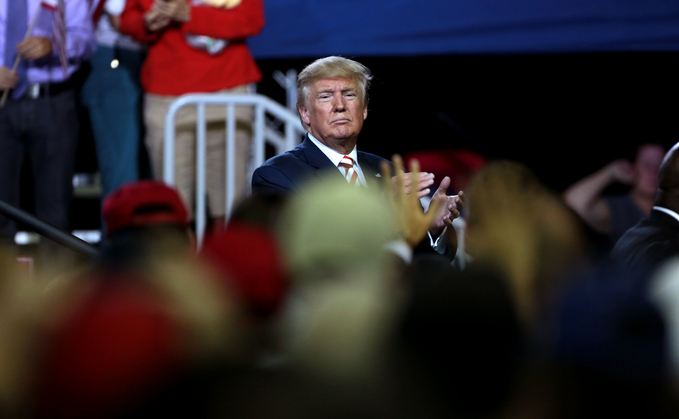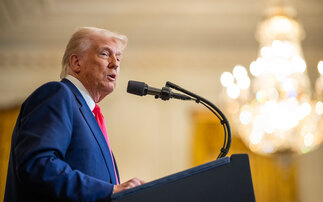
Credit: Gage Skidmore
A Trump presidency will slow US decarbonisation efforts, but he will not be able to reverse the fundamentals that are driving the global clean tech boom
Everything has changed, and nothing has changed.
Donald Trump's victory - in the end completed by a comfortable margin - will now tear like a hurricane through US and global climate efforts. Comforting assumptions about the inevitability of progressive values, the strength of NATO, and the primacy of liberal democracy will be demolished in its wake.
Trump remains too chaotic to be predictable, meaning hopes are continuing to be voiced that his belligerent nationalism and strongman posturing could perversely result in a period of geopolitical stability as America's antagonists consider how to handle a 'mad bastard' in the White House. But there is an unnerving sense that the team around the President-elect is more competent and ruthless than it was last time. That Trump has a better understanding of the policy levers to pull to deliver his instinctively authoritarian and reactionary world view. That the burgeoning network of right-wing and even neo-fascist autocrats, social media grifters, and climate denialist pollutocrats is now better connected and utterly committed to the destruction of liberal democracy.
Meanwhile, the US and international institutions that just about kept Trump's authoritarian impulses in check after 2016 look considerably weaker than they did. With the Republicans in with a shout of securing majorities in the Senate and the House of Representatives and Trump appointees dominating the courts, the new administration has made no secret of its intention to try and import an Orbanist model to Washington.
The likelihood is the world is about to enter a very dark and dangerous period - or rather move deeper into a very dark and dangerous period that has been underway for over a decade as climate impacts escalate, petrostates flex their muscles, and Western democracies struggle to deliver sustainable and equitable economic growth. It is the climate theory of everything, stupid.
This sense of foreboding is only amplified by the visceral nature of the backlash against progressive values evidenced by Trump's victory. The President-elect is a fraudster and a felon. He attempted to orchestrate a coup after losing the last election. He is a climate denier, who also plans to put a vaccine sceptic in charge of public health. He has bragged about sexual assault and his role in the removal of reproductive rights from American women. His own former allies think he meets the definition of a fascist. He still won the popular vote.
The charge sheet mattered not a jot, as a noxious mix of racism, misogyny, and the widespread assumption the Biden-Harris administration was to blame for the inflation unleashed by Covid all combined to torpedo the Democrat campaign.
Trump can now be expected to do precisely what he said he would, and try and enact one of the most right-wing policy programmes in modern US history. The implications for climate action and the green economy are bleak.
The US will almost certainly now quit the Paris Agreement for a second time, and will likely launch a concerted effort to get other petrostates to follow it out the door. Some of them may well be convinced. A policy of appeasement towards Moscow and scepticism towards NATO will threaten the borders of Europe in Ukraine and beyond, necessitating increased investment in defence. Trump's plans to ratchet up tariffs on imports from economic rivals and allies alike could trigger a trade war that reignites inflation globally and puts major barriers in the path of the clean tech roll out.
Domestically, Trump may not be able to repeal the Inflation Reduction Act in full, and he may not want to when much of its largesse is focused on Red States and handed to fossil fuel firms, nuclear developers, and the automotive industry. It is worth noting at this point that Trump's most vocal cheerleader is the world's leading electric vehicle mogul. Corporate America is still largely on board with the net zero transition, even if political polarisation means it talks about it less.
But Trump is still bound to do everything in his power to extend the US hydrocarbon boom. And there are plenty of levers he can pull to put barriers in the way of the wind and solar farms he repeatedly blames for killing birds and whales. It remains to be seen whether Trumpism 2.0 can still be constrained by Congress and the courts, but the Project 2025 manifesto makes it clear that the intention is for a full spectrum assault on environmental regulation, ESG, climate science, and renewables.
An analysis this summer by the website Carbon Brief suggested Trump's policy programme would likely make it impossible for the world to meet the already hugely challenging goal of limiting temperature increases to 1.5C. There is no reason to doubt its integrity. Sensible governments and businesses will be updating their climate resilience strategies accordingly.
And yet, for all the understandable sense of gnawing dread at the prospect of such a repulsive and volatile figure having his stubby fingers on the nuclear button, Trump's victory has not changed the fundamentals driving the global response to the climate crisis.
The world is still on track for around 3C of warming and the risk of bursting through the 2C guardrail and triggering runaway warming remains as profound and terrifying as ever. Atmospheric physics does not care about the identity of the person in the Oval Office. Climate impacts will continue to escalate and most of the world's governments, businesses, and investors will be forced to respond. Trump can joke about rising sea levels creating more seafront properties in Florida, but insurers will not be laughing when the waves are lapping in the foyer. Climate adaptation just moved up the agenda.
Meanwhile, Trump may be a climate denier but most political and business leaders are not that stupid. They understand that until the global economy reaches net zero emissions temperatures will keep rising, resulting in ever increasing risks, surging climate migration, and soaring costs.
As such, the working assumption in climate diplomacy circles is that the overwhelming majority of countries will stand by the Paris Agreement even as Trump storms out the door. The US remains hugely influential, and in quitting the accord it will make it harder to mobilise climate finance and secure bolder emissions targets from other major polluters. But the US is just 10 per cent of global emissions. Next year will still see a wave of fresh national climate action plans submitted to the UN that will prove considerably more ambitious than current net zero strategies. Governments and businesses will once again reach out to work with the US states that continued to advance American decarbonisation efforts throughout Trump's first term.
This confidence is a function of the huge momentum that has built up around the clean energy transition over the past decade. The Chinese government has an explicit strategy to ensure this is China's Century and dominance of booming global clean tech markets is critical to that goal. It is not about to tear up that plan because of a trade war with the US. Indeed, it is more likely to double down as it continues to strengthen ties with the Global South by supporting developing economies' decarbonisation efforts. The EU has similarly made it clear its net zero strategy is its industrial strategy - a view that has only been bolstered since Russia violently highlighted the vulnerability that results from Europe's fossil fuel dependence. The more sensible petrostates have recognised that projected demand is softening with every electric vehicle that hits the road and are looking to diversify their economies as fast as possible.
The pursuit of net zero emissions remains geopolitically essential, while the plummeting cost of clean technologies makes it technically feasible and economically desirable. In recent months, the International Energy Agency has published a series of reports detailing how the global clean tech market is booming, projected fossil fuel demand is slowing, and mature economies are combining increasingly rapid decarbonisation with economic prosperity. Renewables are now cheaper than fossil fuel power in most markets around the world. Grid operators now know how to operate reliable, ultra-low carbon, flexible grids. The electric vehicle market is booming. The heat pump and hydrogen markets could soon follow. There are plausible pathways for decarbonising aviation, shipping, and heavy industry. At the macro level, these trends are largely Trump proof.
In this context, the threat Trump poses to global climate efforts comes not from the direct impact he will have by rowing back on US decarbonisation policies, and more from the indirect impact he could have if his isolationist philosophy and volatile personality trigger a full blown economic crisis or, worse still, a major conflict.
As has been the case since the turn of the century, a Republican victory represents a major blow to global climate action, but if a geopolitical disaster can be avoided over the next four years it will not prove a knock-out one. The Trump presidency will necessitate a shift in strategy - more focus on climate adaptation, increased investment in nascent carbon removal projects, a bigger role for the green business community, closer ties between those liberal democracies still committed to decarbonisation and the emerging economic powerhouses that will determine whether the world sees 2C or 3C of warming. But he will not derail the global push for net zero emissions, because how could he?
The challenge just got more daunting still, but what alternative is there but to keep on keeping on?
Keep up to date with all the latest green business news by signing up to the free Daily and Weekly BusinessGreen Newsletters.









